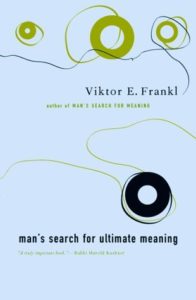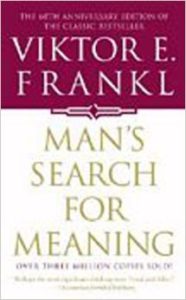This blog was originally published April 16, 2014 on the New Existentialist Blog. It was republished here after the New Existentialist Blog was discontinued.
In a recent email exchange with a friend, Michael Moats, I was teasing him about having a good attitude after witnessing a scary event. What began as good-natured humor also led to an important serious conversation as Michael wisely noted, “I still think there is something here to write on about the martyrish love affair I sometimes hear with people of existentialism.” I deeply appreciate Michael’s positive attitude and believe that it reflects his deep existential nature. For those who know Michael, they can attest that he does a wonderful job at balancing zhi mian (facing life directly and honestly, including the difficult parts) and maintaining a positive attitude.

The Dangerous Lure of Suffering
“…despair is suffering without meaning”
~ Viktor Frankl (2000)
In existential psychology, we often talk of suffering and the value of suffering. While this is not intended to glorify suffering and pain, it often comes across this way. There is nothing glorious or heroic about seeking suffering for the sake of suffering. When we seek suffering for suffering’s sake, we dishonor ourselves and dishonor the deeper potential inherent in suffering. Existential psychology, like Buddhism, advocates that, “suffering exists.” Life and suffering are inseparable; this is a basic given of life. From this recognition, existential psychology often encourages people to be open to the suffering that already exists. This is an important distinction: Existential psychology does not encourage seeking suffering, but rather being open to the suffering that exists in the world.
Seeking and excessively dwelling in suffering is dangerous. It often has negative consequences for our psychological, spiritual, and physical health as well as negatively impacting our relationships. Avoiding or denying our suffering that exists, too, brings with it the same risks. Yet, being open to suffering does not necessitate such seeking of it.
Misplaced Meaning in Suffering
Existential psychology will often speak of finding the meaning in suffering. This language can be somewhat misleading. It is not the suffering itself that is meaningful, but what we do with the suffering. The “in suffering” that is being referred to is the experienced suffering resulting from being open to it. In other words, it is the meaning found while in a state of suffering that is the “meaning in suffering.”
For example, when talking about finding meaning in a tragedy, such as rape, child abuse, or a natural disaster, people will sometimes respond saying, “How can you say this was meaningful! It was not a good thing that this occurred!” Talking of the value of suffering ought not glorify tragedy or suffering. Rather, it is referring to the meaning that can be created and emerge from the tragedy. This does not convert the tragedy into something good, but rather uses the tragedy in the service of creating something good.
As a personal example, one of the things I like most about myself is that I am a compassionate, empathetic person. I am very aware that it is suffering that I experienced in my life, as well as the suffering of those I cared about, that influenced me in becoming a compassionate, empathetic person. It is not good that this suffering occurred, but I am thankful for the very meaningful gifts that emerged largely as a product of this suffering. But it was not a simple linear process of suffering and then becoming compassionate and empathetic. Rather, from an early age I learned to open myself to the suffering that occurred. Through doing this, I was able to explore my suffering and begin working to create meaning from the experience of suffering. Had I chose a different response to the suffering I experienced and witnessed, it could have led to a very different result. Thus, what is meaningful to me is what I created from my suffering, not the suffering itself.
Balance in Existential Psychology
The ability to forget the past enables people to free themselves gradually from the pain they once suffered; but it also often makes them repeat the mistakes of their predecessors.
~ Lu Xun (1923/1961)
The purpose of opening oneself to suffering is to eventually transcend the suffering. When one does this, the suffering does not necessarily go away, but it no longer has the same hold over us and we are able to experience the beauty that often is connected to suffering. For example, our suffering often deeply connects us to others who care about us or who share in our suffering. Suffering is not intended to be the end; it is just part of the journey.
Some people picture existentialists as a group of people who are always serious and maybe even at least mildly depressed. While surely this fits some people who identify as existentialists, my experience is that existentialists tend to be a rather joyful bunch embracing life, laughter, and relationships very deeply. It is critical for us to keep this balance. The principle of zhi main is to face life directly and honestly. When we do this we will experience both the joys and the sufferings of life more deeply.
Applications
I worry that some existential therapists similarly have the instinct to “go for the tears” and see this as what successful therapy is about. This can be an important part of therapy—helping clients open themselves to the pain that they are experiencing and share it. However, therapy, like life, should never glorify suffering and pain. Additionally, existential therapy should also embrace the laughter, the joy, and the celebrations. In life and in therapy, we can zhi mian the joys as well as the suffering.
References
Frankl, V. E. (2000). Man’s search for ultimate meaning. Perseus.
Xun, L. (1961). What happens after Nora leaves home. In Y. Xianyi & G. Yang (Eds. & Trans.) Lu Xun selected works (Vol. 2). Beijing, China: Foreign Language Press. (Original work published in 1923)
Note: this site is owned by Louis Hoffman, this site supports the Rocky Mountain Humanistic Counseling and Psychological Association (RMHCPA), which is a 501(c)3 nonprofit organization. As an Amazon Associate, RMHCPA earns from qualifying purchases made through the links on this page.

 The nemesis of Frankl’s writing has always been the discontinuities of his books. While Frankl’s essays are penetrating and powerful, when brought together in a book format they retained the feel of a collection of essays instead of a unified work. It could be argued that this has always been a limiting factor in logotherapy becoming more influential. Until this book, there has not been a book of Frankl’s which has been able to achieve consistency through the entire piece.
The nemesis of Frankl’s writing has always been the discontinuities of his books. While Frankl’s essays are penetrating and powerful, when brought together in a book format they retained the feel of a collection of essays instead of a unified work. It could be argued that this has always been a limiting factor in logotherapy becoming more influential. Until this book, there has not been a book of Frankl’s which has been able to achieve consistency through the entire piece. I have often heard it suggested that this book should be reread every decade of one’s life. At each stage of life, the book can bring new insights. Many are familiar with the general content of this book, however; no description can adequately deal with the power of the story. The first portion of this book, which entails over half the book, is Frankl’s story of his experience in the concentration camps during World War II. This is both gripping and chilling. I will make no attempts to give an overview of the story because it is a story that each person must read for themselves.
I have often heard it suggested that this book should be reread every decade of one’s life. At each stage of life, the book can bring new insights. Many are familiar with the general content of this book, however; no description can adequately deal with the power of the story. The first portion of this book, which entails over half the book, is Frankl’s story of his experience in the concentration camps during World War II. This is both gripping and chilling. I will make no attempts to give an overview of the story because it is a story that each person must read for themselves.